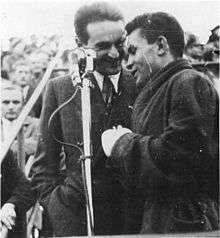György Szepesi
| György Szepesi | |
|---|---|
 Szepesi (left) interviewing bantamweight boxing champion Tibor Csík, 1949 | |
| Born |
György Friedländer February 5, 1922 Budapest, Hungary |
| Nationality | Hungarian |
| Alma mater | University of Physical Education, Budapest |
| Occupation | Radio personality, journalist, and sports executive |
György Szepesi (born February 5, 1922) is a Hungarian radio personality, journalist and sports executive.[1][2][3]
Early life
Szepesi was born György Friedländer into a Jewish family in Budapest, Hungary.[1][4] His father, Miklós Friedländer, died in the Buchenwald concentration camp in 1945.[4] Szepesi himself was forced into a labor battalion in Ukraine, which was disbanded in October 1944.[4] Szepesi then returned to Budapest and lived with Gábor Kocsis, a fellow battalion survivor, Kocsis' wife, and their four children, until mid-January 1945, when the German troops retreated from Hungary.[5]
Szepesi received his doctorate in sports history from the University of Physical Education in Budapest.[1] He played basketball for Hungary’s Vác-Újbuda LTC until the Fascists disbanded the club in 1942.[1]
Career
Szepesi has been on Hungarian radio since April 1945.[1][2][6][7][8] He has covered Olympic Games since 1948, and the Football World Cup since 1954.[1]
Szepesi was a Hungarian Olympic Committee member from 1962 to 2000, and was the Executive Committee Chairman for the Fédération Internationale de Football Association (FIFA) from 1982 to 1994.[1] He was Chairman of the Hungarian Football Association (HFA) from 1978 to 1986.[1] He is honorary chairman of the HFA, and an honorary member of FIFA’s Executive Committee.[1]
Honors
Szepesi received the FIFA Medal in 1994, and the Olympic Order from the International Olympic Committee in 1995.[1][3] He received the Pillar of Achievement Award from the International Jewish Sports Hall of Fame in 1997.[1][2][6]
In 2004, Szepesi was given the Prima Primissa Award in the Hungarian Electronic Press category.[9] In 2005, Szepesi became an honorary citizen of Budapest.[10] That same year, he was decorated with the Middle Cross of the Order of Merit of the Republic of Hungary.[4]
References
- 1 2 3 4 5 6 7 8 9 10 11 "Dr. Gyorgy Szepesi". Jewishsports.net. Retrieved November 3, 2011.
- 1 2 3 Tom Tugend (December 1, 1997). "Paralympic volleyball star made Hall-of-Famer". The Jerusalem Post. Retrieved November 3, 2011.
- 1 2 "Records". Guinness World Records. Retrieved November 3, 2011.
- 1 2 3 4 "Szegedkurir – Szepesi György: Csak apám életét nem tudtam megmenteni". Szegedkurir.hu. Retrieved November 4, 2011.
- ↑ "Felavatták a zsidó munkaszolgálatosok emlékművét" (in Hungarian). zsido.hu. 18 April 2009. Retrieved 11 November 2011.
- 1 2 Scheinberg, Robert (December 2, 1997). "Nine voted to Jewish sports hall". JTA. Retrieved November 3, 2011.
- ↑ Andrei S. Markovits (February 18, 2009). "From the Stands". The Vienna Review. Retrieved November 3, 2011.
- ↑ John Cunningham (2004). Hungarian cinema: from coffee house to multiplex. Retrieved November 3, 2011.
- ↑ "2004-es Prima Primissima díjazottai" (in Hungarian). primissima.hu. Retrieved 11 November 2011.
- ↑ "Szepesi György Budapest díszpolgára lesz" (in Hungarian). Origo. 23 September 2005. Retrieved 11 November 2011.
External links
- The match of the century, by György Szepesi, Hungarian News and Information Service
- Népesedésünk ma és holnap, by György Szepesi, Kossuth, 1986, ISBN 963-09-2840-X
- Hungarian football rhapsody: 70 years of soccer history, by György Szepesi, Pannonia Press, 1968